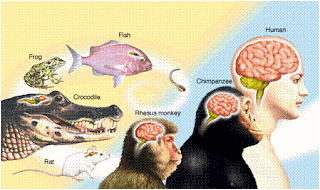By Paola Salazar
How intelligence evolved over time is not a simple question
to answer, even with dozens of researchers spending lifetimes looking into it.
Generally, intelligence across species is considered to be a
result of how an animal responds and manipulates its environment. Our level of
intelligence tends to be attributed to several different theories and has been
a process of development for around 10 million years. There’s much debate
around the different ideas about how we evolved into intelligent beings, but
we’ll do our best to highlight the general idea behind a few of the standing
theories!
One theory is that the evolution of our intelligence is a
result of our use of communication.
The idea is that since we started walking upright and had our opposable (moveable) thumbs, we gradually began having more activities and capabilities that we wanted to pass on to younger generations, like how to hunt, which areas to avoid, how to make stone tools, and more.
The idea is that since we started walking upright and had our opposable (moveable) thumbs, we gradually began having more activities and capabilities that we wanted to pass on to younger generations, like how to hunt, which areas to avoid, how to make stone tools, and more.
And so, our brains began working in different, more complex ways in order to figure out how we could communicate these things, resulting in language. Language can't start off as complicated as it is now, so the theory is that our brain expanded as it tried to keep a hold of these different communications, allowing language to then expand into what it is today, and bringing brain development along for the ride with it.
Another theory is that the evolution of intelligence was
simply an accident caused by us beginning to walk upright. Thanks to the skull
of the Taung child, an infant from one of the oldest ancestors we know of right
now, paleoanthropologists (people who study our
most ancient ancestors) were able to see that their skulls were much more
similar to modern human infant skulls than we originally thought.
Basically, a modern day infant has a skull that isn’t fully
closed and is split into several pieces. As the infant grows up, this opening
is what allows the brain to grow. Gradually, the bone begins to grow and close
around the brain, but this doesn’t fully happen until the age of 2 or so. The Taung child shows evidence of a skull that also was not
fully closed, meaning it already had room for growth! But why is it split to begin with?
Well, when these ancestors began
walking upright, one thing that happened was a shift in the birth
canal of females, which are relatively narrow, and would struggle to fit a
big-headed infant. And so, evolution’s answer to this problem was for the infant to be born with its head being less hard than a full adult’s head so that
it could actually fit through.
The openings allow for the different parts of the skull to
slide over each other during birth, which then allows the brain to get bigger
as the infant grows, instead of inside its mother, like other animals do. Now that’s what I’d call a
happy accident.
The next theory has to do with our DNA. The Human Genome
Project, an international study of the genes that humans carry, led to
scientists noticing that humans have a gene unique to us: the SRGAP2C.
This is a gene that is related to your brain development.
When they implant the gene in mice, it turned off the
activity of the original brain development gene (SRGAP2), and then supercharged
the brain! The researchers who discovered this gene think that the gene may
have first appeared in our genome in some of the earlier Homo species around 2
million years ago, which also happens to be when human brains began to more
quickly develop in size—and also when we begin to see more evidence of complex
activities, like hunting, cooking, and stone-tool use.
 |
| PC: wiringthebrain.com |
One thing that is mostly agreed upon is that the evolutionof intelligence is not necessarily needed in order to survive on the planet. We
as humans have been on the planet for only a small blip in time when you
consider how long the dinosaurs were here, and an even smaller blip when you
consider how old the planet itself is. Again, our ancestors weren’t around
until maybe 10 million years ago, and only about 10 thousand of those years
were spent in actual civilizations.
To that extent, intelligence kind of did evolve accidentally,
regardless of which theory you support. It all goes back to what we said
before: any changes to a species occur as a response to their environment. If
there is no major change, there will be no new developments in the animal’s
makeup.
Paola is a Boston-based science journalist with a
background in social and life sciences.


Hello dear friend
ReplyDeleteHow are you, I Hope You are doing well. I like your post. IT is so amzing . By the way please look at - Summer marks the return of one of our nation's greatest loves, the food festival. And there is no other better known gathering of delicious cuisine than the Taste of Chicago, the world's largest outdoor food festTo know more visit- festivals
Happy moment
Alexandra Ariana